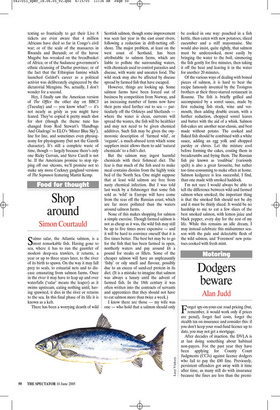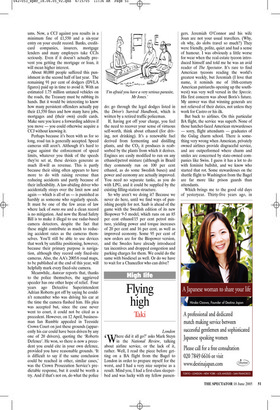Dodgers beware
Alan Judd
Forget spy-on-your-car road pricing (but, remember, it would work only if prices are penal), forget fuel costs, forget the stealth tax on insurance and consider this: if you don’t keep your road-fund licence up to date, you may not get a mortgage.
After decades of inaction, the DVLA is at last doing something about habitual non-payers. For the past year they have been applying for County Court Judgments (CCJs) against licence dodgers who fail to pay the £80 fine. Previously, persistent offenders got away with it time after time, as many still do with insurance because the fines are less than the premi ums. Now, a CCJ against you results in a minimum fine of £1,550 and a six-year entry on your credit record. Banks, creditcard companies, insurers, mortgage lenders and many employers take CCJs seriously. Even if it doesn’t actually prevent you getting the mortgage or loan, it will mean higher interest.
About 80,000 people suffered this punishment in the second half of last year. The remaining 91 per cent of dodgers (DVLA figures) paid up in time to avoid it. With an estimated 1.75 million untaxed vehicles on the roads, the Treasury must be rubbing its hands. But it would be interesting to know how many persistent offenders actually pay their £1,550 fines and how many have jobs, mortgages and (their own) credit cards. Make sure you leave a forwarding address if you move — you could otherwise acquire a CCJ without knowing it.
Perhaps because it’s been with us for so long, road tax is generally accepted. Speed cameras still aren’t. Although it’s hard to argue against the enforcement of speed limits, whatever you think of the speeds they’re set at, these devices generate as much ill-will as revenue. This is partly because their siting often appears to have more to do with raising revenue than reducing accidents and partly because of their inflexibility. A law-abiding driver who accidentally strays over the limit now and again — which is all of us — is punished as harshly as someone who regularly speeds. It must be one of the few areas of law where lack of mens rea and a clean record is no mitigation. And now the Road Safety Bill is to make it illegal to use radar-based camera detectors, despite the fact that these might contribute as much to reducing accident rates as the cameras themselves. You’ll still be able to use devices that work by satellite positioning, however, because their primary purpose is navigation, although they record only fixed-site cameras. Also, the AA’s 2005/6 road maps, to be published at the end of this year, will helpfully mark every fixed-site camera.
Meanwhile, Autocar reports that, thanks to the police themselves, the aggrieved speeder has one other hope of relief. Four years ago Detective Superintendent Adrian Roberts got off by saying he couldn’t remember who was driving his car at the time the camera flashed him. His plea was accepted but, since the case never went to court, it could not be cited as a precedent. However, on 12 April, businessman Ian Rumble appealed in Teesside Crown Court on just these grounds (apparently his car could have been driven by any one of 20 drivers), quoting the ‘Roberts Defence’. He won, so there is now a precedent you could cite in your own defence, provided you have reasonable grounds. ‘It is difficult to say if the same conclusion could be reached in other, similar cases,’ was the Crown Prosecution Service’s predictable response, but it could be worth a try. And if that’s not on, do what the police do: go through the legal dodges listed in the Driver’s Survival Handbook, which is written by a retired traffic policeman.
If, having got off your charge, you feel the need to recover your sense of virtuous self-worth, think about ethanol (for driving, not drinking). It’s a renewable fuel derived from fermenting and distilling plants, and the CO2 it produces is reabsorbed by the plants from which it derives. Engines are easily modified to run on any ethanol/petrol mixture (although in Brazil they commonly run on 100 per cent ethanol, as do some Swedish buses) and power and economy are actually improved. You need no separate tanks, as you do with LPG, and it could be supplied by the existing filling-station structure.
So why aren’t we doing it? Because we never do here, until we find ways of punishing people for not. Saab is ahead of the game with the Swedish edition of its new Biopower 9-5 model, which runs on an 85 per cent ethanol/15 per cent petrol mixture, yielding power and torque increases of 20 per cent and 16 per cent, as well as improved economy. Some 95 per cent of new orders are for the Biopower version, and the Swedes have already introduced tax incentives and dropped congestion and parking charges for them. We could do the same with biodiesel as well. Or do we have to wait for a Chancellor who can drive?

















































 Previous page
Previous page